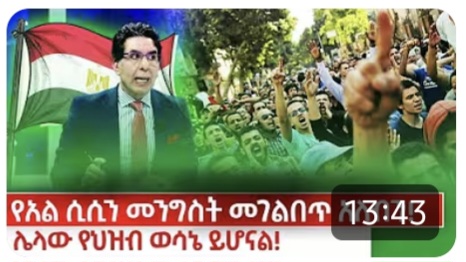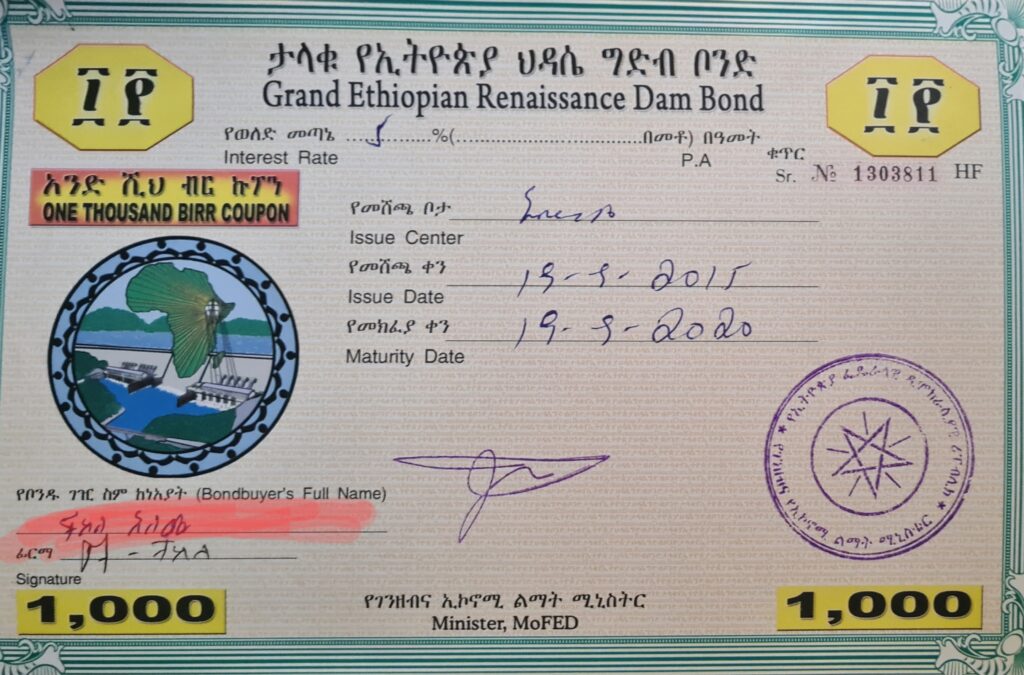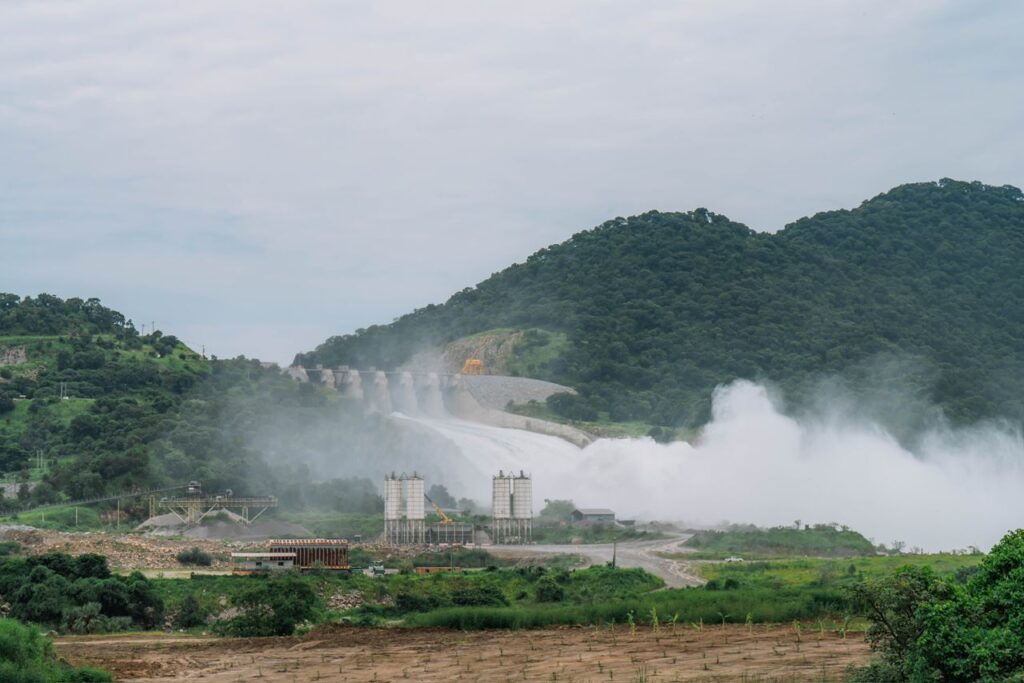Mekelle፡Telaviv, Nairobi, Pretoria, London, (Tigray Herald).
“The Dam That Broke a Presidency? Ethiopia’s GERD Completion Sparks Political Firestorm in Egypt”
By Chekole Alemu Berhe
The Grand Ethiopian Renaissance Dam (GERD), Africa’s largest hydroelectric project and Ethiopia’s defining infrastructure achievement of the 21st century, has reached full completion. As Ethiopia celebrates, a political storm is brewing in Egypt. President Abdel Fattah Al-Sisi, once praised at home for his diplomatic overtures and strongman rhetoric, is now under heavy fire from critics who see the GERD as the ultimate symbol of Egypt’s regional decline.
Among the loudest voices is that of a prominent Egyptian political analyst who recently delivered a scathing televised commentary, accusing Al-Sisi of surrendering Egypt’s most vital national interest. His words were blunt, jarring, and widely circulated on social media:
“The only thing we can do now is bring down Al-Sisi!”
Translated to Amharic by host of Kibg of Abay YouTube Channel
From “I Stopped the Dam” to Diplomatic Defeat
For years, President Al-Sisi boasted of having halted or delayed the construction of the GERD. “I stopped the dam,” he once claimed in a televised address, attempting to reassure a public deeply anxious about its water security. But today, that confidence has collapsed.
“Now, there isn’t even the slightest door left to stop it,” said the analyst. “Diplomacy has failed. The spotlight Ethiopia captured has yielded tangible results, while Egypt’s role has amounted to nothing. The dam is complete. The story is over.”

Indeed, Ethiopia’s unwavering pursuit of the GERD despite international pressure especially from Egypt and Sudan has shifted the geopolitical landscape of the Nile Basin. Construction began in 2011, and successive Ethiopian governments have treated the project as a matter of national survival and pride. After a decade of internal strife, civil war, and external pressure, Ethiopia’s completion of the dam is now being hailed as a rare moment of unity for a fractured nation.
Built by the People: The Role of Ethiopians and the Global Diaspora
The GERD is not just a government project it is a people’s project. From the moment of its launch, Ethiopians from all walks of life were called upon to contribute financially, symbolically, and politically to its success. In a country where millions live in poverty, citizens reached into their limited means to buy bonds, donate salaries, and organize grassroots fundraisers.

My (the writer of the Article)contribution to GERD
Teachers gave portions of their paychecks. Farmers sold livestock to make contributions. Urban workers made monthly payments. Civil servants, youth groups, and university students rallied under a common banner: “This is our dam.”
Perhaps most striking was the role of the Ethiopian diaspora across North America, Europe, the Middle East, and beyond. From Washington to London, Oslo to Johannesburg, Ethiopians abroad organized telethons, cultural nights, and community events to raise millions of dollars in support of the GERD. In some cities, diaspora groups even lobbied Western governments and international media to counter Egypt’s narrative, reframing the GERD as a development right not a security threat.
The collective message was clear: We will build this dam with or without foreign financing.
As international institutions like the World Bank and IMF hesitated, fearing regional tensions, Ethiopians at home and abroad stepped in, transforming GERD into a symbol of pan-Ethiopian resilience, defiance, and sovereignty.
The Declaration That Haunts Al-Sisi
At the center of the political fallout is the Declaration of Principles (DoP) signed by Egypt, Sudan, and Ethiopia on March 23, 2015, in Khartoum. The agreement, endorsed and proudly announced by President Al-Sisi at the time, was intended to ensure cooperation, information-sharing, and peaceful dispute resolution concerning the GERD. Yet for many Egyptians, it has now become a symbol of capitulation.

The Egyptian analyst did not mince words:
“We still have one option in our hands: to remove President Al-Sisi and his appointees. If we do that, we will nullify the Declaration of Principles. We must act before it’s too late.”
This declaration, once hailed as a diplomatic victory, is now viewed by some as the legal noose that legitimized Ethiopia’s dam and neutralized Egypt’s ability to act against it.
Why Egypt Is Cornered
Egypt depends on the Nile River for over 90% of its fresh water. GERD’s filling and operation have always been perceived as an existential threat. Yet, despite international campaigns, UN appeals, and U.S.-led negotiations, Ethiopia has proceeded with each filling phase four in total without heeding Egyptian demands for a binding trilateral agreement.
In sharp contrast to Egypt’s anxiety, Ethiopia has framed the GERD as an African development model: clean energy, regional electricity exports, and economic sovereignty. Its completion sends a message not just to Egypt but to the entire continent Africa can fund, build, and complete mega-projects without external oversight.
The recent Ethiopian messaging even suggested that the government might send a letter of congratulations to President Al-Sisi a provocative move perceived in Egypt as salt in the wound.
Internal Dissent and Regime Fragility
Al-Sisi’s administration now finds itself in an uncomfortable position. The regime, already facing economic pressures, inflation, and growing discontent, is now absorbing anger over a foreign policy failure of immense proportions. The analyst’s call to oust Al-Sisi is no longer an isolated incident but rather part of a growing chorus of dissent among political thinkers, intellectuals, and even retired military officials.
The question looming over Cairo now is not whether the dam can be stopped it cannot but whether President Al-Sisi’s political future can survive this monumental loss of face.
What Comes Next?
As Ethiopia prepares to harness the full energy capacity of the GERD and eyes further irrigation and development projects on the Blue Nile, Egypt may intensify diplomatic efforts but with what leverage? Military action is unlikely, and international mediation efforts have proven fruitless.
The Egyptian public, meanwhile, is watching closely. Many now view GERD not only as an Ethiopian victory but as a national embarrassment for Egypt one that exposes the limits of authoritarian diplomacy in the 21st century.
The fate of the Nile, once a unifying force in Egypt’s historical narrative, has become a divisive political fault line. Whether President Al-Sisi can hold his ground or whether GERD will prove to be the dam that broke his presidency remains to be seen.




